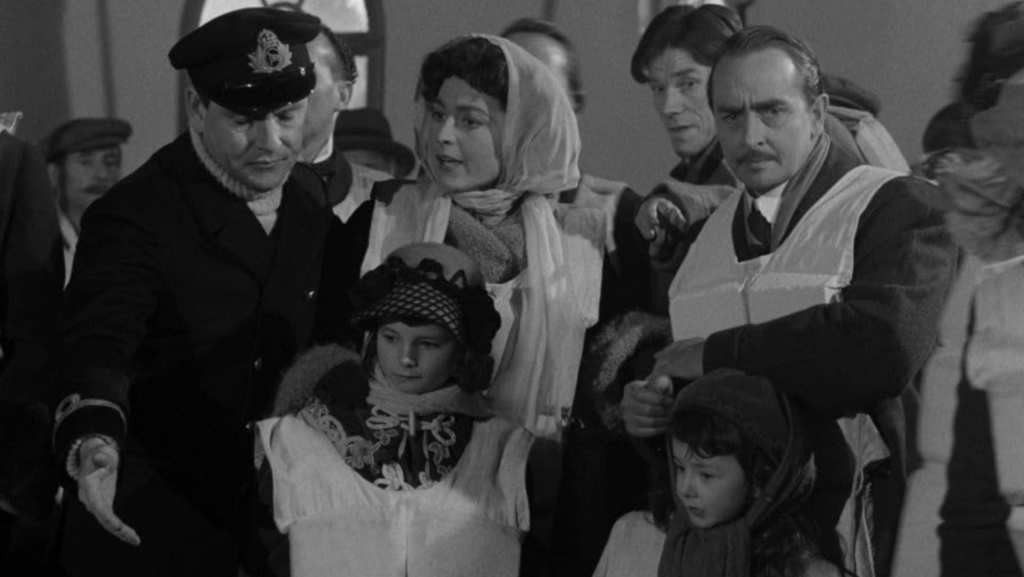“A Night to Remember” is an award-winning 1958 black-and-white movie about the sinking of the Titanic.
On that fateful night in 1912, the ship held 2,224 passengers.
The lifeboats had room for approximately 1,178. One of the film’s most moving elements is the women-and-children-first ethos that largely guided their loading.
That in a life-threatening situation women and children should be saved first is not a written law, now or then. It’s based on the chivalric value that the strong should protect the vulnerable; that women, the bearers and nurturers of new life, deserve special cherishing; that should the men and fathers die, those who come after may know that their lives were a sacrifice.
In one especially poignant scene, a couple, the parents of three young children who are obviously deeply in love, face off over the lifeboat. “I can’t leave you here, Robert,” the wife says quietly. “I’m not going, Robert.”
Robert levels his gaze and speaks with the utmost tenderness and the utmost clarity. “My dear, I never expected to ask you to obey me — but this time I must.”
They exchange a look that says, “We may very well never see one another again but our union, and the children, have been the joy of my life.” And then Robert kisses them goodbye, tells the children to look after their mother, waves cheerily, and turns away, stricken, only then allowing himself tears.
In a similar show of courage, the ship’s band take up their instruments and continue playing to the last — music soothes the nerves, they know — and so they, too, stay at their work-of-mercy watch till the waters close in.
Then there’s Mr. Guggenheim, who, as the ship perilously lists, calls for his impeccably attired valet, removes his unsightly life vest, and dons black tie and tails.
“We are dressed now in our best,” he informs his friends, “and are prepared to go down like gentlemen. If anything should happen to me, I should like my wife to know that I behaved decently.”
In the confusion, some heard, “Women and children only;” others, “Women and children first.”
Thus J. Bruce Ismay, chairman of the White Star line under which the Titanic launched, climbed near the end of the loading process into an almost empty lifeboat, was rescued, and afterward was so mercilessly — and as it turned out, unfairly — shamed in the media for his putative cowardice that he became a lifelong recluse.
Fast forward 112 years to today when biological male athletes regularly pummel, kick, shove aside, outrun, outswim, out-lift, and outbox their female competitors.
Holding their trophies triumphantly aloft, they’re then hailed by much of the culture as brave and radical trailblazers.
What happened? Would a contemporary audience even see the nobility; the code of honor; the sublime ideals of men, notwithstanding their other faults and failings, bred by culture and education almost instantly in a crisis to lay down their lives?
Or would Mr. Guggenheim rather be recast as a vile colonizer, Robert a man-splainer, his wife a downtrodden puppet, and the plucky orchestra milquetoasts unable to exercise the appropriate “self-care?”
C.S. Lewis foresaw the situation well in his long 1943 essay “The Abolition of Man.” His focus was education, and his thesis was that humankind depends on a bedrock of traditions, ideals, and beliefs that he called the “Tao.”
All the world’s great religions and philosophies — chief among them the Christian Gospels — agree on them. They include Duties to Parents, Elders, and Ancestors, Duties to Children and Posterity, The Law of Good Faith and Veracity, The Law of Mercy, and the Law of Magnanimity.
Below, above, or outside the Tao we cannot go. “It is the sole source of all value judgments. If it is rejected, all value is rejected.”
Moreover, the Tao cannot be applied piecemeal. “If the pursuit of scientific knowledge is a real value, then so is conjugal fidelity.” You can’t purport to want to save the planet, and at the same time promote abortion.
As it stands, says Lewis, an education that fails to instill objective values produces “men without chests”: without hearts, without emotions, guided solely by intellect and instinct.
And there is no guarantee that men guided solely by instinct and intellect will be benevolent.
For The Law of General Beneficence is itself part of the Tao.
Let’s not forget that the men of the Titanic, being significantly stronger than either women or children, could easily have elbowed them all aside, left them to drown, and filled the lifeboats first themselves.
What happens when the restraining hand of traditional, objective values, whereby men would rather die than be seen — and to know themselves — as cheaters and bullies and cowards, is entirely removed?
What happens when the strong have killed off all the weak and the vulnerable? When power inevitably becomes ever more concentrated in the hands of the few? When the life-giving procreative urge between men and women has been so thoroughly degraded that our culture becomes one of death?
Such a state of affairs leads inexorably to the abolition of man: man as an ideal, man as a species.
No need to despair: the gates of hell shall not prevail against Christ’s Church. But a 2025 citizen of the world can hardly read Lewis’ essay and fail to shudder with recognition.
“We make men without chests and expect of them virtue and enterprise. We laugh at honour and are shocked to find traitors in our midst. We castrate and bid the geldings to be fruitful.”

